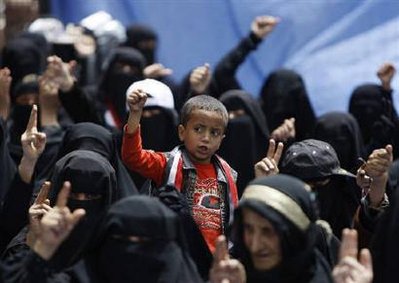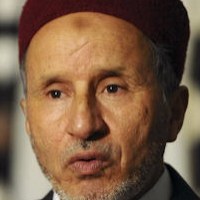![]()
Tue, December 29, 2009 | Counterpunch | By Patrick Cockburn

A boy and female anti-government protestors shout slogans during a demonstration to demand for the resignation of Yemen's President Ali Abdullah Saleh, outside Sanaa University, March 29, 2011. (REUTERS/Ammar Awad)
Multiple Crises – Yemen Next
Since the ousting of Tunisia’s Zine El Abidine Ben Ali and Egypt’s Husni Mubarak, the change Yemen is undergoing is lost in the dramatic events in Libya. However, Yemen is not in any way like Tunisia or Egypt and may become the next Afghanistan if al-Qaida could take advantage of Yemen’s instability. For more background to the current situation in Yemen here’s an article from Patrick Cockburn [written Dec. 2009] which gives some insight.
Yemen is the Afghanistan of the Arab world. It is the poorest Arab country, its government is weak, its people are armed, it already faces a serious rebellion, it is strongly tribal and its mountain ranges are a natural refuge for groups like al-Qa’ida.
There is nothing new about the growing political, social and economic crisis in Yemen, but the world is waking up to it only since the attempt to blow up a Detroit-bound plane has been linked to al-Qa’ida in Yemen. Last night the regional wing of the group claimed responsibility for training and arming Nigerian student Umar Farouk Abdulmutallab with the Christmas Day bomb.
Yemen has been becoming increasingly unstable over the past two decades, ever since Saudi Arabia expelled a million Yemeni workers because Yemen refused to support the US-led war to expel Saddam Hussein’s army from Kuwait in 1990.
Osama bin Laden’s family comes in part from Yemen. Yemenis played a role in the formation of al-Qa’ida. A significant number of the suicide bombers in Iraq come from there. It has been a convenient bolt-hole for Saudi militants under pressure at home to escape to.
The would-be Christmas Day bomber’s personal connection to Yemen will be probed over coming days. But it is clear that al-Qa’ida in Yemen has become stronger and is operating in a sympathetic environment — in a country in which the mass of the population strongly opposes the US invasion of Iraq and intervention in Afghanistan.
There have long been signs of al-Qa’ida activity. The most spectacular was in 2000, when a boat packed with explosives rammed the USS Cole in Aden port, blowing a hole in its side and killing 17 US sailors.
For a time the government in the Yemeni capital, Sanaa, appeared to have arranged an unspoken ceasefire with the local branch of al-Qa’ida. But the invasion of Iraq by the US led to a more militant leadership taking over the group. They were reinforced in 2006, when 23 prisoners escaped from prison in Sanaa, reportedly with the aid of sympathetic Yemeni security officers. The escapees included Nasir al-Wuhayshi, a leader of al-Qa’ida in the Arabian Peninsula (AQAP). Ever since, attacks have been increasing on foreign tourists, missionaries and oil installations. In September 2008 a car bomb outside the heavily fortified US embassy in Sanaa killed 16 people, including six well-armed attackers.
In spring 2008, Saudi commanders of al-Qa’ida told their militants to move to Yemen, and in January 2009 the Saudi and Yemeni wings merged. Saudi Arabia announced a list of its 85 most wanted militant suspects, of whom it said 26 were in Yemen. This is probably the overall membership of AQAP, whose small size makes it difficult to find and eliminate.
Last August a suicide bomber almost killed the Saudi anti-terrorism chief, Prince Mohammed bin Nayef. Last month AQAP killed three senior Yemeni security officers, with their bodyguards, in south Yemen. The Yemeni security chief, Ali Mohammad al-Ansi, says 29 al-Qa’ida members who had been planning to attack the British embassy and oil installations have been arrested.
Washington has quietly been supplying military equipment, intelligence and training to Yemeni forces, who have raided suspected al-Qa’ida hideouts. On Christmas Eve, Yemeni forces targeted a gathering of top militant leaders, possibly killing a radical cleric linked to the US Army major accused of the Fort Hood shooting in the US in November.
Joseph Lieberman, chairman of the Senate Homeland Security Committee, admitted yesterday that the growing US presence in Yemen includes Special Operations, Green Berets and intelligence. In 2009, the Pentagon provided Yemen with $67m in overt counter-terrorism assistance; officials have proposed expanding that in 2010.
Mr Lieberman, who recently visited Sanaa, said a US official there told him that “Iraq was yesterday’s war. Afghanistan is today’s war. If we don’t act pre-emptively, Yemen will be tomorrow’s war.”
The Yemeni government will do what it can to show the US it is willing to go after al-Qa’ida. But the threat to its own existence comes from various directions: first, the civil war it is fighting with Shia revivalists — who it claims are backed by Iran — in the northern province of Saada; then secessionism in the south sparked by discontent over the outcome of Yemeni unification in 1990 and the civil war that followed; and finally a growing economic crisis as Yemen’s small oilfields, which provide revenue, are running out.
Pressure from the US to pursue al-Qa’ida will be one extra strain on a government which has been unable to cope with these multiple crises.
Patrick Cockburn is the author of ‘The Occupation: War, resistance and daily life in Iraq’ and ‘Muqtada! Muqtada al-Sadr, the Shia revival and the struggle for Iraq.



 RSS
RSS










Multiple Crises – #Yemen Next | #Saleh http://j.mp/eiC2EE
RT @CrethiPlethi: Multiple Crises – #Yemen Next | #Saleh http://j.mp/eiC2EE